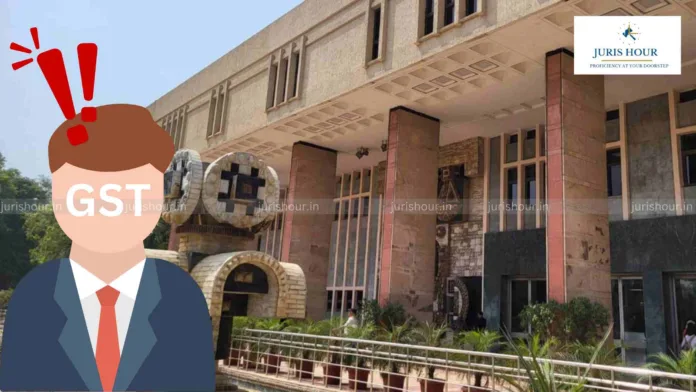The Delhi High Court has cautioned the GST Department against indolence in statutory flexibility and held that the financial liability and penal cases cannot remain unresolved for years.
The bench of Justice Yashwant Varma and Justice Harish Vaidyanathan Shankar has relied on the decision in the case of Vos Technologies India (P) Ltd. v. Director General in which it was held that matters having financial liabilities or penal consequences cannot be kept unresolved for years; and the phrase “where it is possible to do so” cannot be a license to keep matters pending for years. The flexibility provided by the legislation is not meant to be misused or construed as sanctioning indolence. The statutory leverage cannot be brought into play routinely and in an unfettered manner for years, without any due justification or explanation.
The petitioner/assessee, registered with the Service Tax Commissionerate, Delhi, is engaged in the execution of the Engineering, procurement, and construction contracts (EPC) pertaining to the setting up of, sub-stationson turnkey basis, transmission line and system/towers, maintenance of such systems, meter installation, activity of supplying transformers, transmission equipments, electrical parts, wires, poles etc which are used in the transmission of power and deals with distribution company engaged in the distribution of electricity in various States.
The Petitioner entered into two work contracts with Dakshin Haryana Bijli Vitran Nigam, Hisar, Haryana4 on 19.07.2011. The first work contract was executed for the supply of goods for the commissioning of 09 electric sub-stations and the second was for the civil part for the commission of those electric 09 sub-stations.
The Petitioner contended that the entire work was divided into two parts of work contracts, which were separate and independent and the latter one was exigible to Service Tax at the rate of 4.12%. The Petitioner was availing Central Value Added Tax5 credit of Service Tax paid on input services.
An audit of the Petitioner was conducted by the officers of Respondent for the FY 2011-12 under Rule 5A of the Service Tax Rules, 1994, which led to the issuance of the first SCN dated 18.10.2013 to the Petitioner for FY 2008-09 to 2011-12 as the Department was of the view that composite work contracts were divided by the Petitioner into two parts, which was otherwise a composite work contract.
The department alleged that by dividing the work contract into two parts and paying service tax applicable under only one work contract, service tax amounting to Rs. 21,01,50,386 has been evaded by the Petitioner.
The department filed an appeal before the Customs Excise and Service Tax Appellate Tribunal (CESTAT). The Tribunal set aside the order and remanded the matter back to the original Adjudicating Authority for the purpose of verifying the claim of the Petitioner and as to whether, on certain contracts, the Petitioner has paid full rate of service tax rather than the concessional rate of service tax under the composition Scheme.
In the interregnum, the Department issued four (4) other SCNs dated 21.05.2014, 07.09.2015, 13.10.2016 and 01.03.2018 for FYs 2012-13, 2013-14, 2014-15 and 2015-16 to 30.06.2017, respectively, demanding tax along with interest and penalties.
The SCN dated 21.05.2014 was a follow-up of the SCN dated 18.10.2013 and the infractions and provisions mentioned in that were applicable to this subsequent SCN.
In the SCN, it was also alleged that the Petitioner is ineligible for seeking exemption from payment of service tax qua the job work provided by the Railway to the joint venture (which included the Petitioner as well).
As per the department, the contract by the Railway was awarded to the joint venture and not the Petitioner directly. As per the Petitioner, the service was exempt from payment of service tax under theNotification No. 25/2012 dated 20.06.2012 for services provided to government authorities.
These SCNs were decided together vide the order dated 23.08.2024; and thus, it is apparent that the department kept the SCNs pending for periods between 6 to 10 years.
Section 73 of the Act empowers the taxing authorities to issue SCN(s) to the assessee, chargeable with service tax, which has not been levied or paid or short-levied or short-paid or erroneously refunded. After issuance of the SCN, Section 73(4B) of the Act casts a duty upon the authorities to determine the due amount of service tax withinsix months/ one year, where it is possible to do so, from the date of notice.
The court noted that despite a hearing conducted on 30.10.2015 (in respect of SCN dated 07.09.2015, for FY 2013-14), the department did not issue the final order for approximately 9 years. Had the SCN dated 07.09.2015 been decided in 2015, the SCNs dated 21.05.2014, 13.10.2016 and 01.03.2018 could also have been adjudicated on similar lines as it had similar issues.
The court quashed the SCNs dated 18.10.2013, 21.05.2014, 07.09.2015, 13.10.2016 and 01.03.2018 and the order dated 23.08.2024 issued by the department.
Case Details
Case Title: Ms Shyam Indus Power Solutions Pvt Ltd Versus Principal Commissioner Cgst Delhi North
Case No.: W.P.(C) 17168/2024 & CM APPL. 72863/2024 (INTERIM RELIEF)
Date: 20.03.2025
Counsel For Petitioner: Smit Goel
Counsel For Respondent: Atul Tripathi
Read More: GST Interest Alert: Contractors Under Scrutiny for Late Declaration of Outward Supplies





